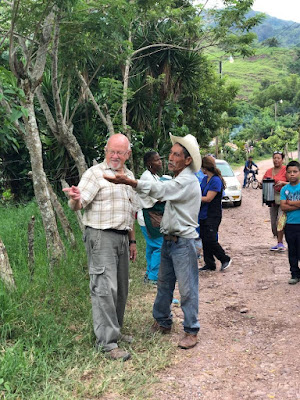Five years an ordained deacon but, when I look back at my life, much of my life has been spent in a diaconal ministry. Serving those in need has been part of my life since high school and so I see my ordination as confirming my vocation of being a servant, deepening it in Christ the Servant, and opening up new horizons.
A few months after I was ordained, my pastor asked me what was different.
Except for presiding at Baptisms and weddings, and more presiding at Celebrations of the Word, not much had outwardly changed. Before ordination, I had been taking communion to the sick, assisting and giving reflections at Celebrations of the Word with Communion in remote villages, training catechists and accompanying extraordinary ministers of Communion.
But there have been changes.
First of all, I find myself becoming more "present" to people who are sick or caring for the sick as well as to people grieving at the loss of a loved one or suffering in one way or another.
I don’t find myself doing more, but there is a different spirit in my ministry.
Visiting the sick, the elderly, and the homebound, bringing them Communion, and just praying with them is an important part of my ministry. For the most part, I try to go where there are no communion ministers or the needs are great.
I also find myself at more funerals, wakes, or prayers during the novenarios, the nine days of prayer after a person is buried.
Being present to a family that has lost a member, being present at a community suffering after a violent death, or just praying around a casket in a home have opened up depths of compassion and tenderness that I didn’t know I had.
During the early months of the pandemic, I did go out a few times, mostly for funerals and occasionally to help bring supplies to communities. After last November’s hurricanes, I found myself visiting the most affected areas, sometimes just to listen to the people explain what they are experiencing. I also have tried to accompany people in efforts to rebuild, especially encouraging community-based efforts to help families whose homes were destroyed or damaged.
I also, aside from the first few months of the pandemic, usually go to a rural village for Sunday morning Celebrations of the Word with Communion, especially where there is no communion minister. I often visit some of the sick in that village.
Sunday afternoons, I try to get to Mass in one of the towns or villages of the parish. Almost every week, the pastor or the associate has me preach at these Masses, mostly to give them a break (since they often have three or four Masses each Sunday). I thus preach much more than many deacons.
Another essential part of my diaconal ministry has been to accompany those who are doing pastoral work in their villages, mostly the catechists, the communion ministers, and those involved in social ministry.
I was doing some of this before, but now I look on this ministry in a different way. Pope St. Paul VI and Pope St. John Paul II both spoke of the permanent diaconate as the animator or driving force of the diakonia of the people of God.
I am not just training people to be catechists or communion ministers, or helping people respond to the needs of the people in social ministry, I am trying to help them live their baptism, as member of Jesus who is prophet, priest, and servant-king.
This is a challenge because it is trying to break down any notion that only a cleric lives out these ministries.
My role is not to do, though I need to be available to teach and preach, to preside as celebrations and distribute communion, as well as baptize and witness marriages, and to respond to the many needs of the parish which is very poor.
My role is to foster the participation of the people in their three-fold ministry, role, of being prophets, priests, and servants, to open spaces where they can exercise their ministry, their diaconia, and to help them develop the skills – and more importantly, the spirituality, to be active members of the Body of Christ.
I had some idea of this before but my experience as a deacon has helped me to understand this more as well as to incorporate this in my ministry.
Accompanying the People of God also means, for me, learning from them, listening to them, being at their side.
I love this photo that someone took, several years ago, when I was accompanying the medical group, AMIGAS, in a rural village. The man from the village is showing me where we would be serving. He was my guide.
Finally, my ministry continues to stretch me – pulling me out of myself but also trying to let go of any desire for control. I’m slowly learning how to be more available, which is really important when calls come at 6:00 am, sometimes for a funeral.
I am also developing and trying to live out a spirituality of pastoral work which is much more open to all. I see my role as opening spaces where people can live their lives of faith, personally, in their families, and in their communities, or, perhaps better stated, opening spaces for grace.
May I continue to try to be faithful to my call – to be of service to those in need, reflecting the Icon of Christ the Servant, and opening up spaces where the People of God can live as true servants of God and be a Church of the Poor.









No comments:
Post a Comment